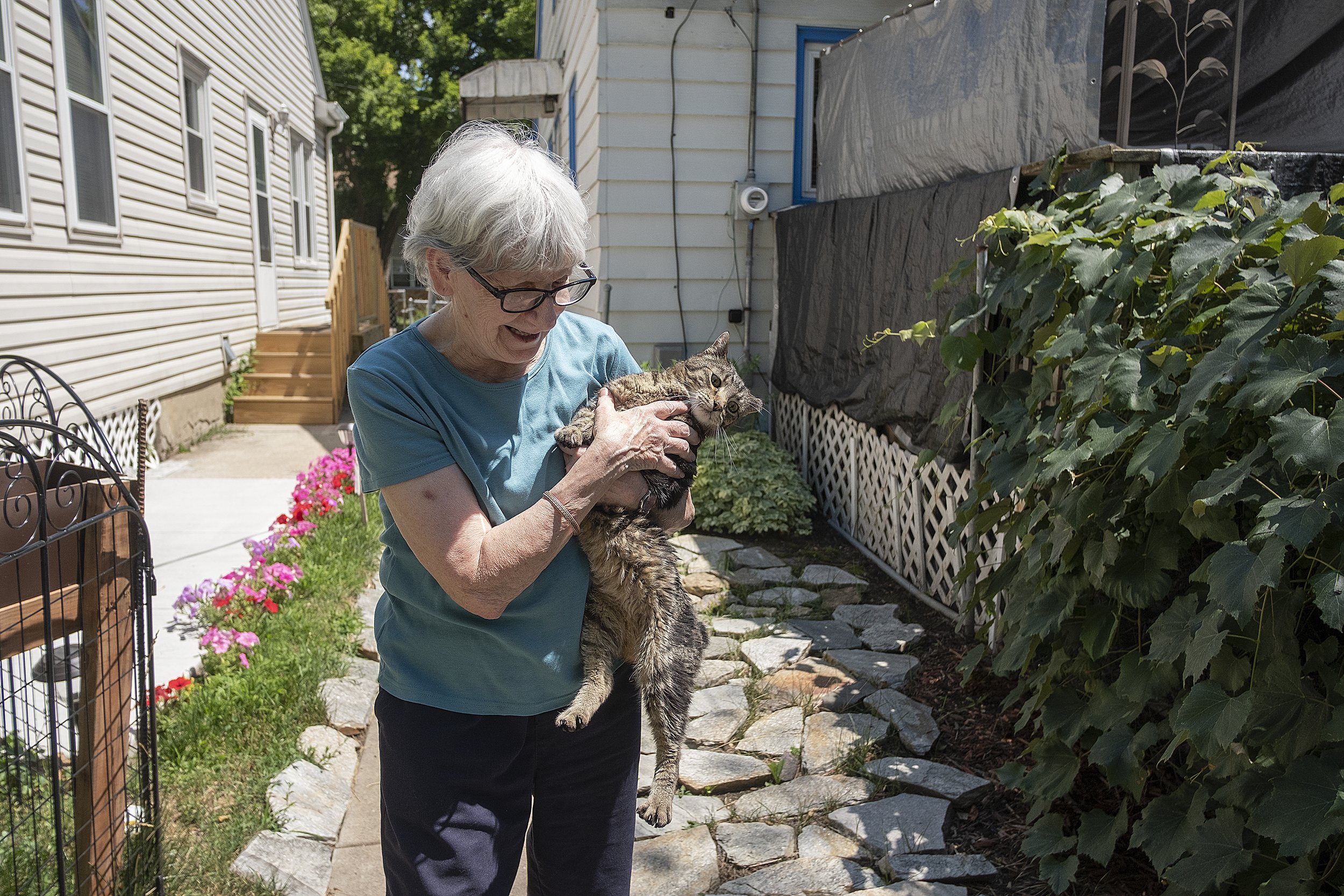Rescue groups find purrfect balance with growing cat colonies
Madison Weissenborn holds a newborn kitten that had been napping with his two siblings and momma. Photo by Aketzally Murillo Alvarado.
By Aketzally Murillo Alvarado, North News Intern
Rita Dominguez fed one cat out in her backyard and before long she had a colony of strays living behind her North Minneapolis home.
“I feed em, and they get along,” Dominguez said.
North Minneapolis, more than any other part of the city, has continuing colonies of stray cats. TNR and rescue organization Pet Project Rescue spend 95 percent of their time trapping, neutering and releasing cats.
Founding Director Maia Rumpho said streets are overwhelmed with cats as a result of unchecked breeding amongst strays and feral colonies.
Pet rescue organizations say there has been an uptick in cats on the street since the Covid-19 pandemic and cat wards in animal shelters are overwhelmed.
A new addition to the shelter, James, is lonely and ready for adoption! Photo by Aketzally Murillo Alvarado
“Right now we only have one empty kennel left,” said Madison Weissenborn, volunteer and community engagement coordinator for Minneapolis Animal Control Center (MACC).
Both Rumpho and Weissenborn noticed more cats were surrendered and the pandemic exacerbated an issue that was already prevalent for current and former pet owners.
“COVID is kind of like a catalyst,” Weissenborn said. “There's so many problems regarding pet ownership, and there's so many barriers for so many people.”
Some pet owners face economic hardship, housing instability, homelessness that make pet expenses, including neutering and spaying, near impossible. Many make the heartbreaking decision to surrender their cat to a shelter or leave it on the street. The result is an abundance of unneutered and unspayed cats that create colonies on the street, and overflow in animal control centers.
Maia Rumpho sets up a trap for stray cats in Rita Dominguez’s backyard. The cats will be caught, neutered, and then released back onto the street. Photo by Aketzally Murillo Alvarado
Minnesota Spay and Neuter Assistance Program (MN SNAP) was built in North Minneapolis in 2021 to support residents for this exact issue. In a statement to North News in 2021, Executive Director Anna Kucera said they chose North Minneapolis because their client base mainly comes from this community. The Northside Pet Resource Center on 44th avenue hosts clinics that are sold out almost immediately.
She fed one cat
Between three of the cats that Dominguez initially fed, 15 more were born and turned into a colony. Pet Project Rescue intervened when they were patrolling North Minneapolis for other cat colonies and found Dominguez.
Dominguez let Rumpho teach her about trap and release (TNR), a method of animal population control that prevents animals from overwhelming communities. The two now work together to make sure the cats that come to her yard are spayed and neutered so they don’t breed and multiply the problem.
“There were about 25 cats here when we started in the area,” Rumpho said. “And we took about three or four litters of kittens out.”
The organization has trapped and released 6,000 cats since 2008.
In the midst of being overwhelmed with cats, veterinary clinics, shelters, and organizations like Pet Project Rescue are severely understaffed, forcing them to lean on volunteers.
A solution to make space for cats in the shelter at MACC is fostering, an alternative to adoption which they’ve made more sustainable for those interested.
Toria Costa spends her days fostering one cat at a time with MACC and has always felt a need to care for pets.
“Seeing pets want to come up to you and be a pet knowing all that they've been through,” Costa said in awe. “Also, just seeing them just recover from crazy injuries/conditions and seeing them bounce back, their resilience and trust is just so amazing.”
Rita Dominguez carries Boom Boom away from the traps so he doesn’t steal the food meant for the strays. Boom Boom was the original, the first cat that Rita Dominguez started feeding in her backyard. Photo by Aketzally Murillo Alvarado




